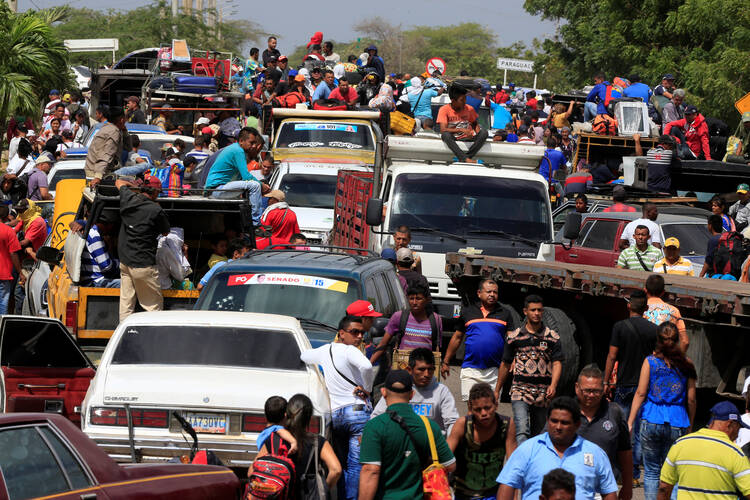VATICAN CITY (CNS) -- With the help of the Migrant and Refugee Section of the Vatican Dicastery for the Promotion of Integral Human Development, eight bishops' conferences in Latin America have joined efforts to assist Venezuelans in transit through or settling in their home countries.
Called "Bridges of Solidarity," the two-year pastoral program seeks to "find common solutions to the challenges posed by the massive flow of Venezuelans, who have decided to move to another South American country in recent years," the Vatican office said in a press release May 7.
After a period of study and discussion, the bishops' conferences of Argentina, Bolivia, Brazil, Chile, Colombia, Ecuador, Paraguay and Peru forged a coordinated action plan to offer needed services to Venezuelans, other vulnerable migrants and the local communities that host them, the office said.
The bishops' conferences of Argentina, Bolivia, Brazil, Chile, Colombia, Ecuador, Paraguay and Peru forged a coordinated action plan to offer needed services to Venezuelans.
The initiative was a response to Pope Francis' call to "welcome, protect, promote and integrate migrants and refugees" and reflects many of recommendations made in the guide put out by the Migrant and Refugee Section: "Responding to Refugees and Migrants: Twenty Action Points."
The project, which was launched in May, is expected to assist "hundreds of thousands" of Venezuelans, Scalabrini Father Fabio Baggio, undersecretary of the Migrants and Refugees Section, told reporters May 7.
The section's other undersecretary, Jesuit Father Michael Czerny, told reporters how valuable it is for migrants to receive even just basic information when they arrive in a new country.
"I happen to be a refugee myself," said the priest, who was born in the former communist Czechoslovakia and raised in Canada.
He said every refugee and migrant arrives in a new place wondering, "What awaits you? What lies ahead? What do you need to know now" so as to be better prepared, and not surprised or disappointed?
It's important, he said, that "as people undertake these difficult journeys, they are supplied with good information all along the way."
"That is also a form of prevention of trafficking," he said, "because people are trafficked when they lack the necessary information in order to make good decisions."
Some of the services, which will be run by parishes, local Caritas organizations and other Catholic providers, include:
- Shelters and centers for vulnerable migrants;
- Help with job and housing searches, work and stay permits, and social inclusion;
- Facilitated access to education and health services;
- Training for church workers providing assistance and awareness campaigns.










